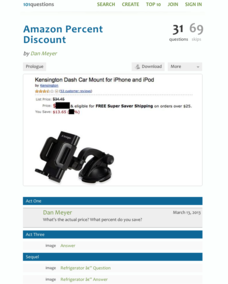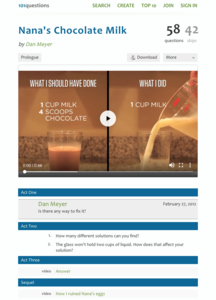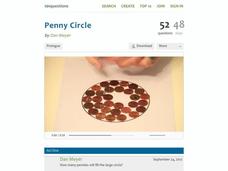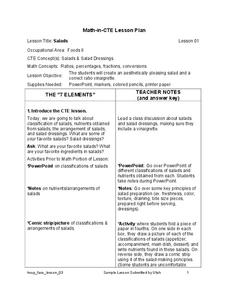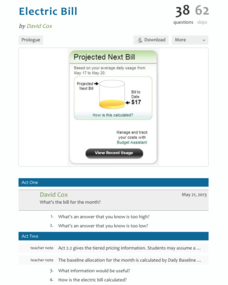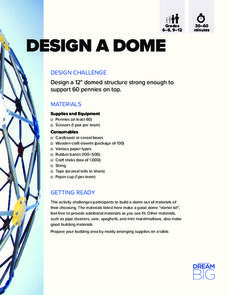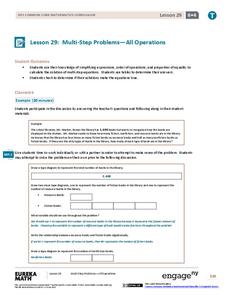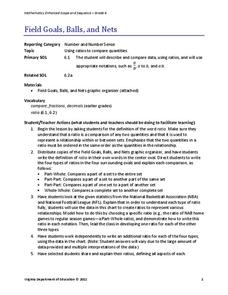101 Questions
Amazon Percent Discount
Everyone loves a good sale! A straightforward lesson provides practice with calculating a percent off of a product. Using ads from Amazon, individuals calculate the percent off the ad does not show. Pupils see the answer after revealing...
101 Questions
Gas Station Ripoff
Ever wonder if you can trust the pump that pumps your gas? Budding mathematicians use video evidence to analyze the cost-per-gallon ratio at different intervals for three different pumps. Their goal is to identify the pump that is...
101 Questions
Popcorn Picker
A video and popcorn, just like being at the movies! Given the dimensions of two different cylinders, scholars decide which will hold the most popcorn. They find out if their calculations are correct with the provided solution video.
101 Questions
Binder Clips: Large, Medium, Small
Ever wondered how many pieces of paper a binder clip can hold? Viewers of a short video are about to find out! Given measurement data for three different sized binder clips, learners must develop a method for figuring out how many pieces...
101 Questions
Nana's Chocolate Milk
Nobody wants to make Nana mad! Help Mr. Meyer fix the chocolate milk he prepared for his Nana using too many scoops of chocolate. Youngsters develop a problem-solving strategy that leads to the solution using ratios and proportions.
101 Questions
A Penny Saved is a Penny Earned
How many pennies can you save in a lifetime? One individual knows the answer! A video presentation of a question asks scholars to determine how many pennies a bank customer has saved since he was a teenager. They know the total weight of...
101 Questions
Would You like Fries with Your Order?
Ever wonder what you are paying for a single fry at McDonald's? An engaging lesson compares the cost per fry in a small order to a larger order. It's a great application of unit rate that is sure to make your classes hungry for more!
101 Questions
Finals Week
What energy drinks have the highest concentration of caffeine? Pupils compare five energy drinks with different amounts of caffeine and different volumes. They must solve the ratios to understand the differences. An extension compares...
101 Questions
Penny Circle
Watch as your classes buy into a rich lesson full of information. A video opener challenges individuals to determine the number of pennies that fit in a circle with a 22-inch diameter. Using lesson materials, scholars collect data and...
National Research Center for Career and Technical Education
Photoshop Scale
Say cheese! Can your class take a great photo and size it to fit any need? A career and technology-centered lesson plan demonstrates the correct way to resize images in Adobe Photoshop. Scholars view a presentation and work individually...
National Research Center for Career and Technical Education
Salads
Lettuce talk for a moment about your culinary scholars; do they have what it takes to create a great salad? Show them the finer points of salad preparation with a career and technology lesson that combines direct instruction, creativity,...
101 Questions
Electric Bill
A brilliant resource is at your disposal. Future consumers investigate and discuss an electric bill. Given only partial information, they estimate the monthly bill. They then consider how tiered pricing will affect the bill.
Benjamin Banneker Association
Celebrate Benjamin Banneker
Inventor, astronomer, surveyor, mathematician, clock maker. Learners celebrate the life of Benjamin Banneker by building creative analog clocks, making scale models, and solving problems related to surveying. The activities model the...
Yummy Math
Sweethearts Candy
Sweethearts® candies are a beloved Valentine's Day treat—so much so that eight billion hearts are produced every year around the world! Learners use number sense reasoning and critical thinking to solve nine word problems about the...
DiscoverE
Design a Dome
Do domed structures have advantages over their less-than-spherical counterparts? Junior architects explore the pros and cons of domes through a design challenge. Teams work together to plan, sketch, build, and test domes created from an...
CK-12 Foundation
Sums of Geometric Series
Geometric series either get bigger or approach a single number. So, how do you know which it is? An interactive presents three different geometric series with varying common ratios. With the aid of patterns, pupils determine values of r...
CK-12 Foundation
Sequence: The Sequence Calculator
Work through a sequence in discovering number patterns. Using the interactive, pupils explore arithmetic and geometric sequences by setting the initial value and the common difference or ratio. Learners distinguish between the two types...
CK-12 Foundation
Finding the nth Term Given the Common Ratio and the First Term: Dominoes
Topple misunderstandings of geometric sequences. Using a context of creating ever-increasing sizes of dominoes, pupils develop a geometric sequence. The scenario provides the size of the first domino and the common ratio between...
GeoGebra
Yardwork in Segments
Stretch your knowledge of ratios to the coordinate plane. The interactive allows pupils to set the endpoints of a directed line segment and form a right triangle. Using rubber bands, users visualize the line segment divided into equal...
National Council of Teachers of Mathematics
Scale Factor
Does doubling mean everything doubles? Learners adjust the scale factor between two rectangles. Using the calculated measurements, pupils investigate the ratios between the lengths, perimeters, and areas of the rectangles.
Education Development Center
Similar Triangles
Model geometric concepts through a hands-on approach. Learners apply similar triangle relationships to solve for an unknown side length. Before they find the solution, they describe the transformation to help identify corresponding sides.
CK-12 Foundation
Points that Partition Line Segments: Cutting a Log
Teach ratios of line segments using an interactive approach. Scholars examine a line segment in the shape of a log and use their knowledge of ratios to divide it into various partitions. As an introductory lesson, the segment has a...
EngageNY
Multi-Step Problems—All Operations
Harness the power of algebra to solve problems. Young mathematicians learn to work out multi-step problems by applying algebraic techniques, such as solving equations and proportions. They use tape diagrams to model the problem to finish...
Virginia Department of Education
Field Goals, Balls, and Nets
Score a resource on ratios. Young mathematicians learn about different ways to express ratios. Using sports data, they write statements about the statistics in ratio form.


